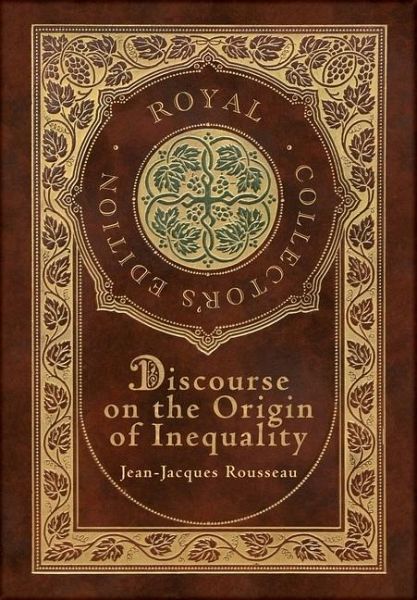
Jean-Jacques Rousseau
Gebundenes Buch
Discourse on the Origin of Inequality (Royal Collector's Edition) (Case Laminate Hardcover with Jacket)
Versandkostenfrei!
Versandfertig in über 4 Wochen

PAYBACK Punkte
16 °P sammeln!




Discourse on the Origin of Inequality is a philosophical work. Rousseau exposes his conception of a human state of nature, broadly believed to be a hypothetical thought exercise, and of human perfectibility, an early idea of progress.
Jean-Jacques Rousseau (28 June 1712 - 2 July 1778) was a Genevan philosopher, writer and composer. His political philosophy influenced the progress of the Enlightenment throughout Europe, as well as aspects of the French Revolution and the development of modern political, economic and educational thought. The perspective of many of today's environmentalists can be traced back to Rousseau. He believed that the more men deviated from the state of nature, the worse off they would be. Rousseau taught that men would be free, wise, and good in the state of nature and that instinct and emotion, when not distorted by the unnatural limitations of civilization, are nature's voices and instructions to the good life. His Discourse on Inequality and The Social Contract are cornerstones in modern political and social thought. Rousseau's sentimental novel Julie, or the New Heloise (1761) was important to the development of preromanticism and romanticism in fiction. His Emile, or On Education (1762) is an educational treatise on the place of the individual in society. Rousseau's autobiographical writings exemplified the late-18th-century "Age of Sensibility," and featured an increased focus on subjectivity and introspection that later characterized modern writing. During the period of the French Revolution, Rousseau was the most popular of the philosophers among members of the Jacobin Club. He was interred as a national hero in the Panthéon in Paris, in 1794, 16 years after his death.

Produktdetails
- Verlag: Engage Books
- Seitenzahl: 68
- Erscheinungstermin: 26. Januar 2021
- Englisch
- Abmessung: 229mm x 152mm x 8mm
- Gewicht: 272g
- ISBN-13: 9781774761625
- ISBN-10: 1774761629
- Artikelnr.: 64372688
Herstellerkennzeichnung
Libri GmbH
Europaallee 1
36244 Bad Hersfeld
gpsr@libri.de
Für dieses Produkt wurde noch keine Bewertung abgegeben. Wir würden uns sehr freuen, wenn du die erste Bewertung schreibst!
Eine Bewertung schreiben
Eine Bewertung schreiben
Andere Kunden interessierten sich für











